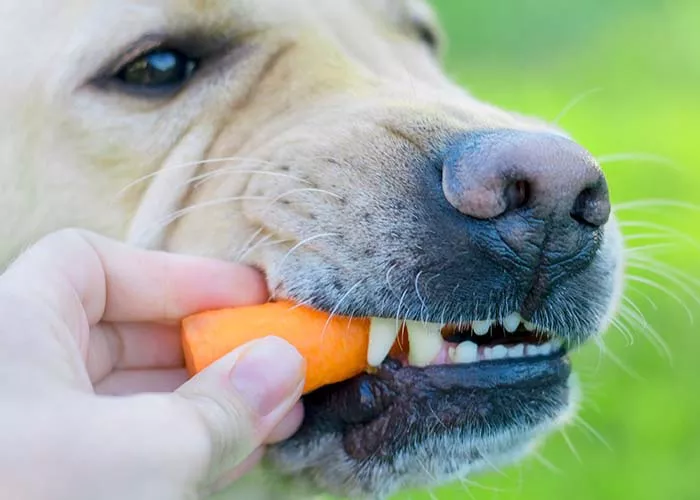Whether it’s safe for dogs to eat carrots is a question many dog owners want to know. The short answer is yes, dogs can eat carrots. However, there are a few things to keep in mind when feeding carrots to your dog.
In this essay, I will provide you with all the details you need to know about feeding your dog carrots. I will discuss the nutritional benefits of carrots, how to prepare and serve them to your dog, and any potential risks associated with feeding your dog carrots.
Nutritional benefits of carrots for dogs:
Carrots are a great source of nutrition for dogs. They are low in calories, high in fiber, and packed with vitamins and minerals. Carrots are an excellent source of vitamin A, which is essential for maintaining good vision, a healthy immune system, and healthy skin and coat. They also contain vitamin K, which helps with blood clotting, and vitamin C, which is an antioxidant that helps fight off disease.
Carrots are also a good source of potassium, which helps regulate blood pressure and supports healthy muscle and nerve function. They contain calcium, which is important for strong bones and teeth, and phosphorus, which is necessary for energy production and cell function. Additionally, carrots are rich in beta-carotene, which is converted into vitamin A in the body and has been shown to have anti-inflammatory properties.
How to prepare and serve carrots to your dog:
When feeding your dog carrots, it is important to prepare them properly. Raw carrots can be difficult for dogs to digest, so it is best to cook them before feeding them to your dog. You can steam, boil, or bake the carrots, but avoid adding any seasonings or spices that could upset your dog’s stomach.
You can also feed your dog carrots as a treat. Cut the carrots into small pieces or sticks and give them to your dog as a snack. You can also mix cooked carrots into your dog’s regular food for added nutrition.
Potential risks of feeding your dog carrots:
While carrots are generally safe for dogs to eat, there are a few potential risks to keep in mind. First, if your dog eats too many carrots, they may experience digestive upset, such as diarrhea or vomiting. This is because carrots are high in fiber, and too much fiber can cause gastrointestinal issues.
Second, if your dog has diabetes, you should be careful about feeding them carrots. Carrots are high in natural sugars, which can cause a spike in blood sugar levels. If your dog has diabetes, talk to your veterinarian before feeding them carrots.
Finally, if your dog has a history of bladder stones or urinary tract infections, you should avoid feeding them carrots. Carrots contain oxalates, which can contribute to the formation of bladder stones and increase the risk of urinary tract infections.
Additional benefits of feeding dogs carrots:
In addition to the nutritional benefits mentioned earlier, feeding your dog carrots can have other positive effects on their health. For example, the fiber in carrots can help promote healthy digestion and prevent constipation. This is especially important for older dogs or dogs with digestive issues.
Carrots can also help keep your dog’s teeth clean and healthy. The crunchy texture of raw carrots can help scrape plaque and tartar off your dog’s teeth, reducing the risk of dental problems like gum disease.
Feeding your dog carrots can also be a great way to provide them with mental stimulation and prevent boredom. Giving your dog a carrot to chew on can keep them occupied and entertained, especially if they are a heavy chewer.
Tips for introducing carrots to your dog’s diet:
If you’re interested in feeding your dog carrots, there are a few things to keep in mind when introducing them to your dog’s diet. First, start with small amounts and gradually increase the amount over time. This will allow your dog’s digestive system to adjust to the new food and prevent any digestive upset.
Second, monitor your dog’s reaction to the carrots. If you notice any signs of digestive upset, like diarrhea or vomiting, stop feeding them carrots and consult your veterinarian.
Finally, be aware of the calorie content of carrots. While carrots are low in calories, they still contain some calories, so it’s important to factor them into your dog’s overall diet. If your dog is overweight or obese, talk to your veterinarian about how many carrots you should be feeding them.
Conclusion:
In conclusion, carrots are a safe and nutritious treat for dogs when fed in moderation and prepared properly. They are packed with vitamins and minerals that support overall health and well-being. However, it is important to be aware of the potential risks associated with feeding your dog carrots, especially if your dog has a history of digestive issues, diabetes, or urinary tract problems.
Related Topics:


